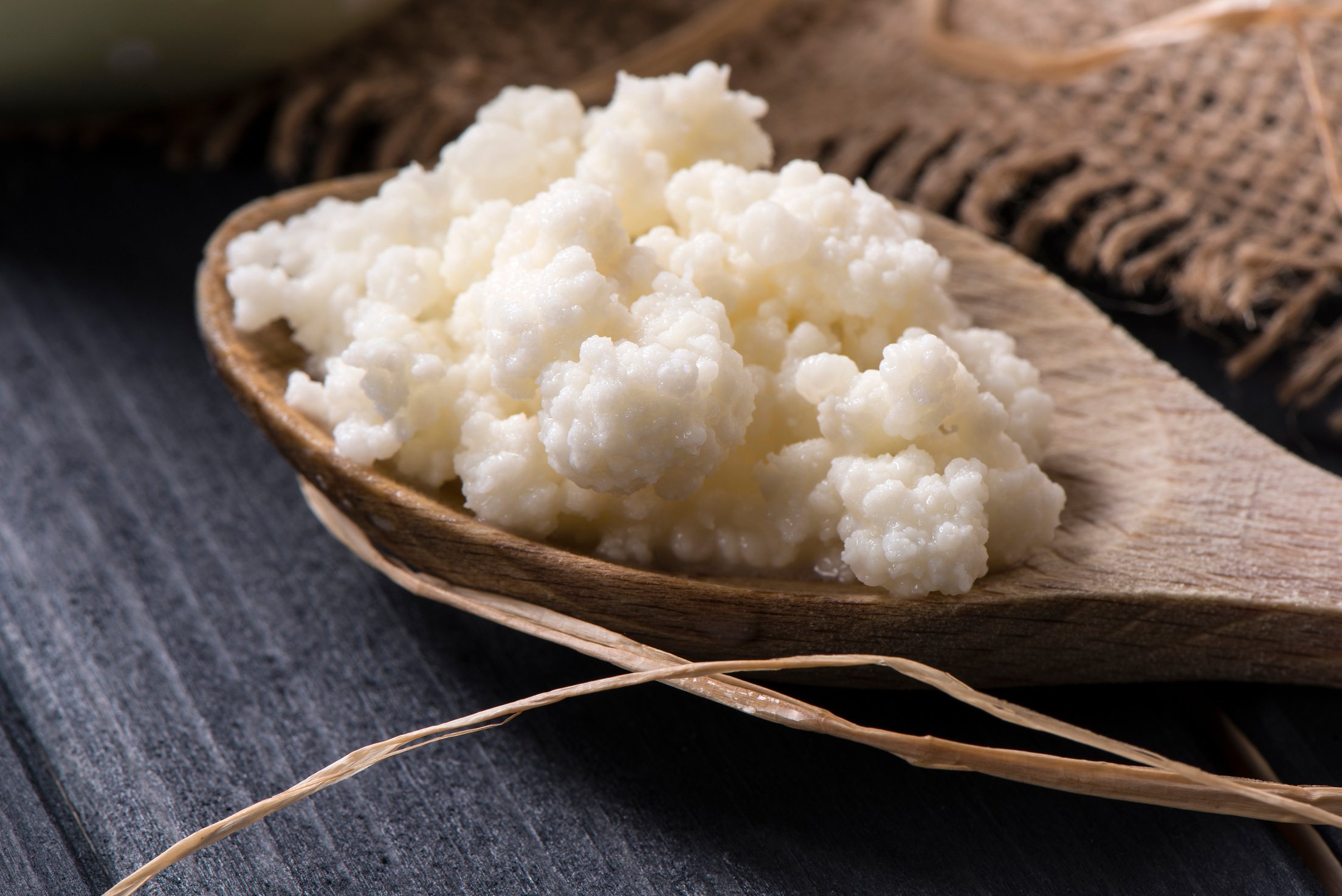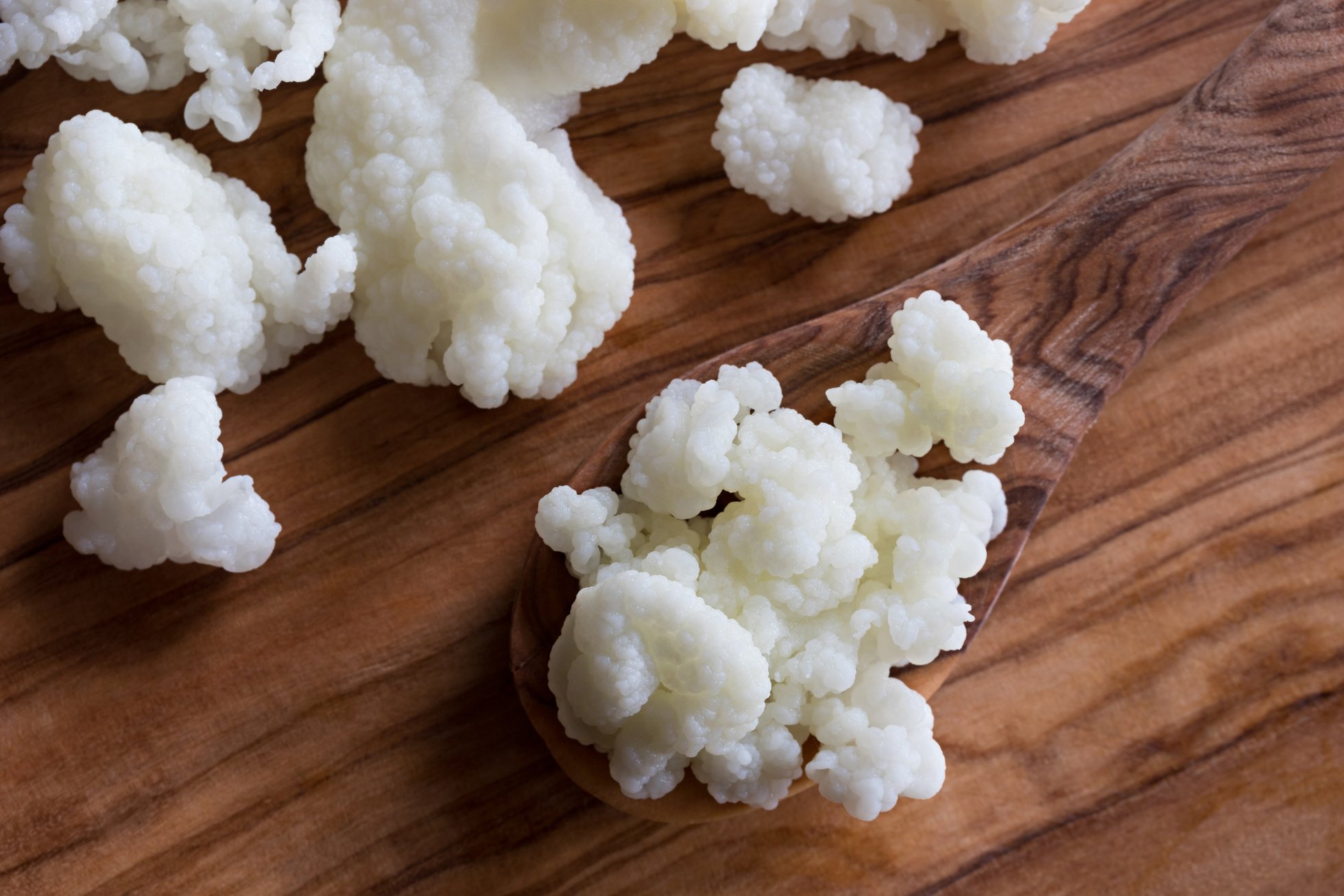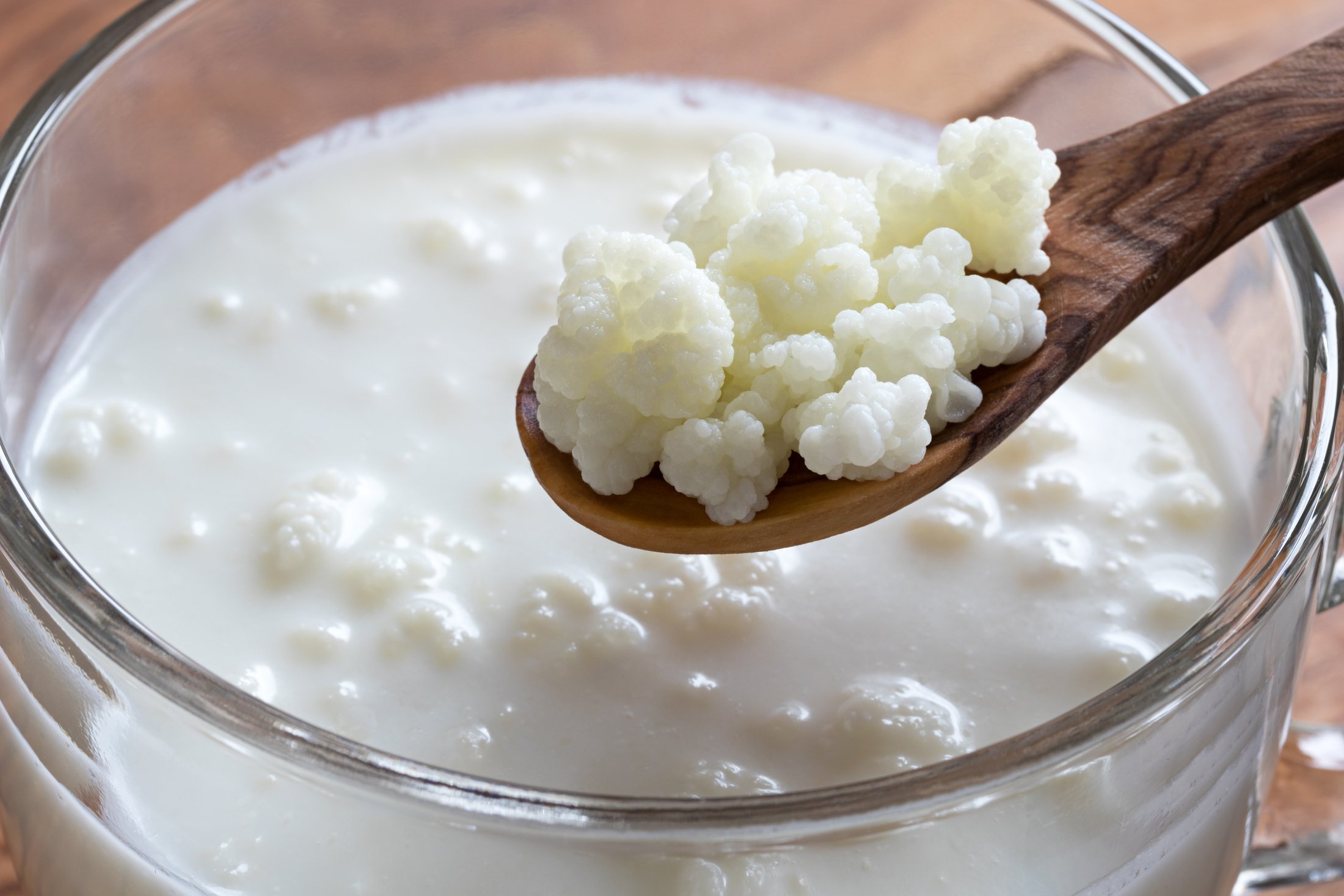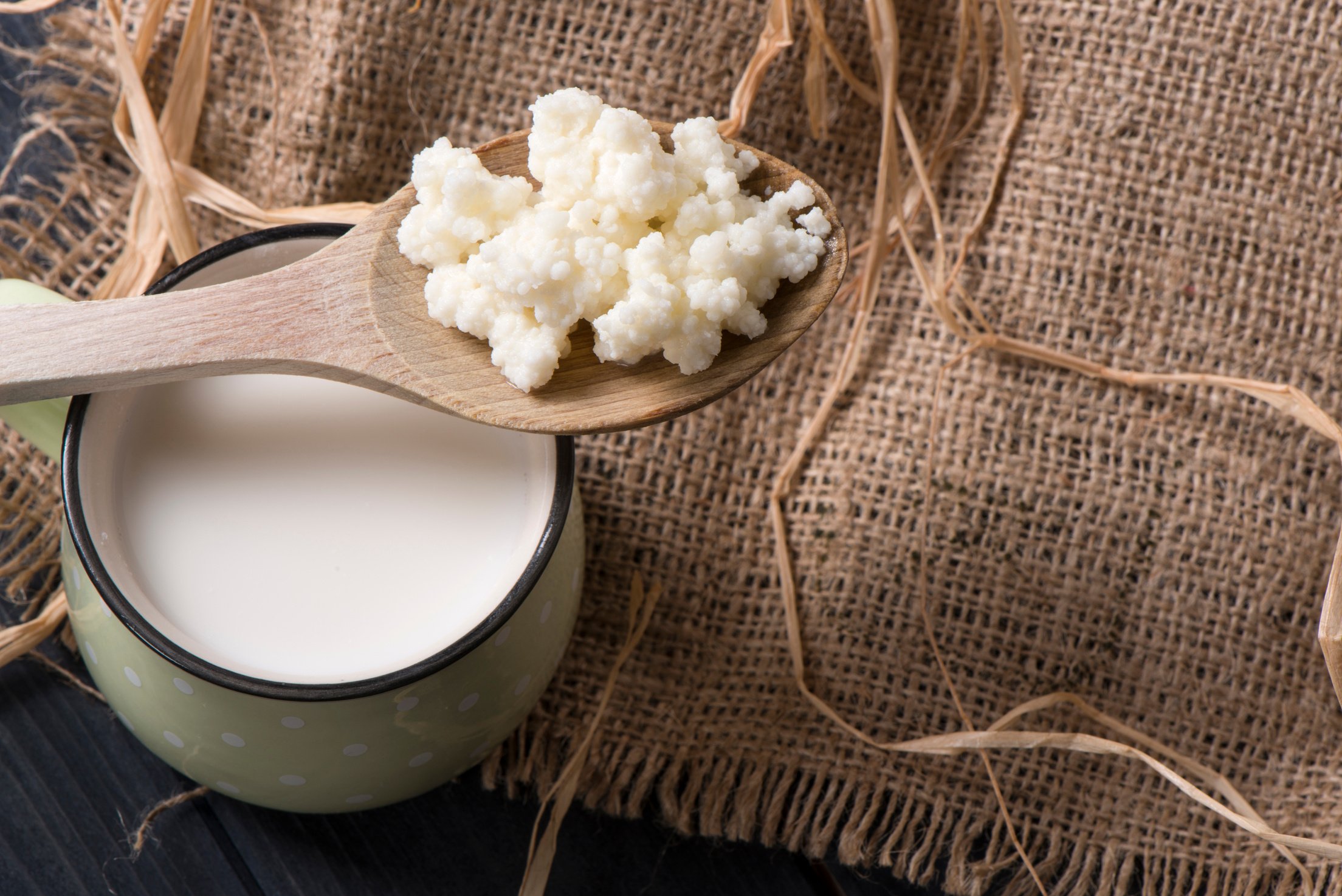

Kefir
Grains & fermented drink
Kefir
Grains & fermented drink
Kefir is a fermented milk drink that originated in the Caucasus region, particularly in Russia & Turkey as a way to preserve milk. It is made by fermenting milk with kefir grains, which are a combination of bacteria & yeast cultures (SCOBYs-Symbiotic Culture/Colony Of Bacteria & Yeast). Making Kefir a naturally occurring source of bio-diverse pre-, pro- & post-biotic.
Kefir is known for its tangy flavor & creamy texture, & it's often likened to a drinkable yogurt.
Nutrients includes: Vitamin D, Riboflavin (Vitamin B2), Magnesium, Vitamin C, Calcium, Vitamin K, Folate, Phosphorus & Protein. In addition to probiotics, it has natural enzymes that encourage proper digestion.
Some health benefits of drinking kefir may include:
*Individual responses to kefir can vary, and it's essential to incorporate it into a balanced diet for maximum benefits.
Increase in...
HDL (the good guy)
Cognition
GI Absorption
Decrease in...
Blood Pressure
Total Cholesterol & LDL-C (the bad guy)
A1C & Blood Sugar
Weight
Inflammation
Oxidative Stress
Fatty Liver
Candida (yeast) & UTIs
Post-viral fatigue & more

Caring For Kefir GrAIns
Caring For Kefir GrAIns
Here's a helpful guide to get you started.
Acclimate new grains: When you receive your kefir grains, it's important to acclimate them to their new environment. Start by placing the grains in a clean glass jar and cover them with fresh milk. Let them sit at room temperature for 24 to 48 hours, stirring occasionally.
Materials Needed:
1. Kefir grains
2. Glass jar
3. Milk (preferably whole milk, NOT ultra-pasteurized & NOT raw milk.)
4. A breathable cover (e.g., cloth, coffee filter, rubber band or fermenting lid.)
5. Plastic, silicone or wooden spoon or spatula
6. Strainer: Fine, mesh; Nylon or non-metal
7. A clean glass container with plastic lid for finished kefir

Step 1: Preparing the Jar
- Use a clean glass jar with a plastic lid.
- Make sure it's big enough to hold your kefir grains and milk, leaving some space at the top.
Step 2: Adding Kefir Grains
- Place your kefir grains into the jar.
Step 3: Adding Milk
- Pour in fresh, preferably whole milk until the jar is about 3/4 full.
- Leave some space at the top for expansion.
Step 4: Covering the Jar
- Cover the jar with a breathable material, like a coffee filter or cheese cloth. You can also use a fermenting lid or pickle pipe lid.
---Secure with a rubber band or string.
STEPS
STEPS
***Option to do a 2nd fermentation before refrigerating, for 4-6 hours with choice of sweeteners & flavors- maple syrup, fruits, jams/preserves, peels, & syrups. Refridgerate afterwards
Step 5: Fermentation
- Place the jar at room temperature, away from direct sunlight.
- Let it ferment for 12-48 hours, depending on your taste preferences. The longer you leave it, the tangier it will become.
Step 6: Straining
- Use a plastic or wooden spoon to gently stir the mixture.
- Strain the kefir through a plastic, nylon or other non-metal strainer into a clean container.
- The grains will remain in the strainer. Use your spoon or spatula to mash the grains & wring them out through the strainer.
Step 7: Starting a New Batch
- Place the kefir grains back into the fermenting jar.
- Add fresh milk and repeat the process.
Step 8: Storing Finished Kefir
- Store the finished kefir in the refrigerator to slow down fermentation and enjoy it cold.

ONE generous TSBP of live, never frozen, milk kefir grains
$36

Contact to Order
kjrz@milkmoneyg2g.com
Tips
- Clean your equipment regularly with hot water, but avoid using soap as it can harm the kefir grains.
- If you don't plan to make kefir for a while, store the grains in the refrigerator with a little milk to keep them alive.
-Use the right milk: Kefir grains thrive on dairy milk, but they can also be cultured in non-dairy alternatives like coconut or almond milk. However, it's best to begin with dairy milk as it provides the necessary nutrients for the grains to grow and ferment properly.
Troubleshooting
- If your kefir grains are growing too quickly, share them with friends or reduce the amount of milk you use.
- If the kefir smells off or develops mold, discard it and start fresh.
-Maintain the right temperature: Kefir grains prefer a temperature range of 65°F to 80°F. Keep them in a warm spot, away from direct sunlight and extreme temperature changes. If the room is too cold, you can use a heating pad or wrap a towel around the jar for insulation.
-Resting and storage: If you need a break from making kefir, or if you have extra grains, you can store them in the refrigerator. Place the grains in a clean container, cover them with milk, and seal the lid. The cold temperature slows down their activity, allowing them to rest for a week or two. Change the milk every 7-10 days to keep them nourished.
Enjoy your homemade kefir! It's a healthy and tasty addition to your diet!
*Disclaimer: The information contained on this website is for informational purposes only. Although the information is evidence-based & articles are available per request, these statements have NOT been evaluated by the FDA. The information provided in this website does not claim to diagnose, treat, prevent or cure any diseases. Discuss with a healthcare professional about health concerns before starting anything new.
*Disclaimer: The information contained on this website is for informational purposes only. Although the information is evidence-based & articles are available per request, these statements have NOT been evaluated by the FDA. The information provided in this website does not claim to diagnose, treat, prevent or cure any diseases. Discuss with a healthcare professional about health concerns before starting anything new.
